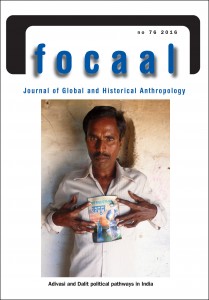 We are pleased to announce that the latest issue of Focaal – Journal of Global and Historical Anthropology has recently published and is available online at its new home, www.berghahnjournals.com/focaal.
We are pleased to announce that the latest issue of Focaal – Journal of Global and Historical Anthropology has recently published and is available online at its new home, www.berghahnjournals.com/focaal.
Category Archives: Blog
Gavin Smith: Out of the academic enclosure
Marc Edelman ends his recent piece on FocaalBlog, “The forces of justice and decency will need to move from feel-good slacktivism to the streets, to face-to-face engagement, whether lobbying, community organization, or classroom dialogues.” This got me thinking. In the following manner…[1]
Continue reading
Marc Edelman: The nastiest candidate won: Now what?
In the end it was filmmaker Michael Moore who got it right. It wasn’t Nate Silver of FiveThirtyEight.com, with his sophisticated polling models, or Nobel Prize winning economist and liberal pundit Paul Krugman, who confessed on election night that “I truly thought I knew my country better than it turns out I did.”
Continue reading
Leo Grob: Ruptures, Consolidations, Continuities: Reconsidering Global Economic Processes since 1945
This conference report was first published in H-Soz-Kult; the full conference program can be found here.
The 1970s increasingly move into the spotlight of contemporary history research. The decade is often portrayed as one of profound change, a radical rupture driven by watershed moments such as the oil crisis or the end of the Bretton Woods system of fixed currency exchange rates. This is not only the major take on the decade in recent publications by historians such as “Nach dem Boom” (Doering-Manteuffel and Raphael 2010) or “Age of Fraction” (Rodgers 2011), but also a well-established analytical approach across the social sciences and humanities (some of the most widely cited works in this regard are Harvey 1990, 2005). The international conference “Ruptures, Consolidations, Continuities: Reconsidering Global Economic Processes since 1945,” held at the Centre of Global Studies at the University of Bern, thus was a timely project to engage this paradigm. Over two-and-a-half days, researchers from the social sciences and the humanities came together to question the big “-isms” of 20th century-periodizations, such as Fordism, Post-Fordism, Keynesianism, and Neoliberalism.
Continue reading
Jonathan DeVore: Reflections on crisis, land, and resilience in Brazil’s politics of distribution
Brazil is at a critical juncture. Improvements in social welfare that have been achieved over the past two decades threaten to recede as the Workers’ Party (Partido dos Trabalhadores, PT) is removed from power. Yet the goods that have been objects of Brazil’s various social programs recede and persist in different ways. Once given, some things are harder to take away.
Lesley Gill and Norbert Ross: What’s class got to do with it?
Unsettled by Donald Trump’s bigotry and xenophobia, liberal pundits have struggled to understand his improbable anointment as the nominee of the Republican party. Many have sought answers in the experience and behavior of the white-working class, the bedrock of Trump support. Why, asks the New Yorker’s James Surolecki, would any working class person support Trump. Surolecki believes that part of the answer lies in the appeal of Trump’s nativist rhetoric. For William Galston, writing in Newsweek, working class whites vote for Trump because they “seek protection against all the forces that they perceive as hostile to their way of life—foreign people, foreign goods, foreign ideas.” And wary of Trump backers and their potential for violence if the Republicans lose the presidency, Salon’s Michael Bourne locates white working class anger in “1960s-era legislation for promoting the interests of immigrants and minorities over their own, just as they blame free-trade policies of both parties for sending their jobs offshore.” According to Bourne, they are either the hapless “victims of American progress or a bunch of over privileged bigots.”
Continue reading
Bruce Kapferer: Brexit and Remain: A pox on all their houses
A crisis is always good for humor. The English satirical magazine Private Eye caught the spirit of uncertainty and the possible tragedy of Brexit—that many of those who voted for it may have intensified their abjection as a result. One spoof comment for The Daily Turkeygraph (a composite of the conservative Daily Mail and Telegraph papers) written by Jeremy Paxo (a reference to the news commentator Jeremy Paxman, also a brand of stuffing mix) was headlined “TURKEYS VOTE FOR CHRISTMAS IN REFERENDUM CLIFFHANGE.R. Another for The Indepandent (sic, The Independent, a liberal/conservative paper) headlined “BRITAIN VOTES TO LEAVE FRYING PAN AND JUMP INTO FIRE.”
Continue reading
Sian Lazar: Learning to live with crisis: How Brexit brought Latin America home to me
The European Union is a free trade area that enables multinational corporations to take advantage of low tax regimes for their head offices and of low labor costs for their manufacturing, caller center, and human resources operations. It forces countries to pay off the debt owed to private banks at the cost of democracy, jobs, pensions, welfare benefits, and economic stability (let alone growth), enabling public subsidy of private risk. It blocks entry to migrants risking their lives to come and work in Europe, or to escape war and poverty in their countries of origin. Why would anyone support a vote for Britain to Remain?
Karen Sykes: The estranged citizens of Brexit
It was political
16 June 2016
I first heard the BBC Radio 4 announce the death of the Labour MP for the Spen Valley, West Yorkshire while I was driving along the A62 from Manchester, where I work, to the Colne Valley, where I live. My commute follows an ancient trade route that crosses the fold of the Pennines at Standedge Edge to enter the West Riding, a political region still known as West Yorkshire, even today with its multicultural cities of Leeds, Halifax, Bradford, and Huddersfield. The county is an interlocking series of valleys running east and west, in which large derelict textile mill sites cast long shadows along the same canals and roads that once carried their products away to the rest of the world. In the previous year on the occasion of her first address to the UK Parliament, the MP had called up West Yorkshire’s history, which was her own history:
Continue reading
Alessandro Zagato: Teachers struggles and low intensity warfare in the south of Mexico
The teachers’ campaign in defense of public education and against the neoliberal reforms being introduced by the Mexican government has ignited a new cycle of social struggles and an outbreak of violent repression in Mexico. This short article was written from within the barricade/encampment of San Cristobal de Las Casas (Chiapas), where, for nearly two weeks, organized teachers together with a supportive heterogeneous population are blockading the highway to Tuxtla Gutierrez—the state’s capital. The encampment of San Cristobal is one of the dozens of blockades that have been set up over the last few weeks all across the country.
